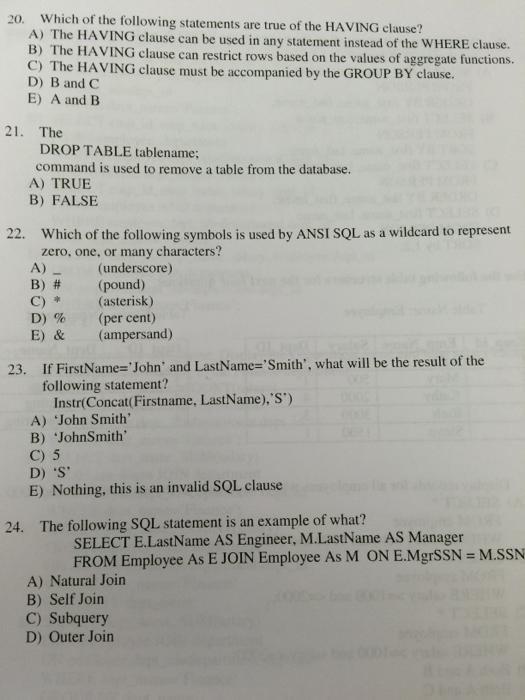Answered step by step
Verified Expert Solution
Question
1 Approved Answer
20. Which of the following statements are true of the HAVING clause? A) The HAVING clause can be used in any statement instead of

20. Which of the following statements are true of the HAVING clause? A) The HAVING clause can be used in any statement instead of the WHERE clause. B) The HAVING clause can restrict rows based on the values of aggregate functions. C) The HAVING clause must be accompanied by the GROUP BY clause. D) B and C E) A and B 21. The DROP TABLE tablename; command is used to remove a table from the database. A) TRUE B) FALSE 22. Which of the following symbols is used by ANSI SQL as a wildcard represent zero, one, or many characters? (underscore) B) # C) * D) % E) & (pound) (asterisk) (per cent) (ampersand) 23. If FirstName='John' and LastName='Smith', what will be the result of the following statement? Instr(Concat(Firstname, LastName),'S') A) John Smith' B) 'JohnSmith' C) 5 D) 'S' E) Nothing, this is an invalid SQL clause 24. The following SQL statement is an example of what? SELECT E.LastName AS Engineer, M.LastName AS Manager FROM Employee As E JOIN Employee As M ON E.MgrSSN= M.SSN A) Natural Join B) Self Join C) Subquery D) Outer Join
Step by Step Solution
★★★★★
3.43 Rating (153 Votes )
There are 3 Steps involved in it
Step: 1
The detailed answer for the above question is provided below 20 Which of the following statements ar...
Get Instant Access to Expert-Tailored Solutions
See step-by-step solutions with expert insights and AI powered tools for academic success
Step: 2

Step: 3

Ace Your Homework with AI
Get the answers you need in no time with our AI-driven, step-by-step assistance
Get Started


